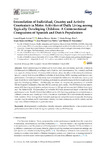Mostrar o rexistro simple do ítem
Interrelation of individual, country and activity constraints in motor activities of daily living among typically developing children: a cross-sectional comparison of spanish and dutch populations
| dc.contributor.author | Delgado-Lobete, Laura | |
| dc.contributor.author | Montes-Montes, Rebeca | |
| dc.contributor.author | Pértega-Díaz, Sonia | |
| dc.contributor.author | Santos-del-Riego, Sergio | |
| dc.contributor.author | Cruz Valiño, José Manuel | |
| dc.contributor.author | Schoemaker, Marina M. | |
| dc.date.accessioned | 2020-03-25T10:21:04Z | |
| dc.date.available | 2020-03-25T10:21:04Z | |
| dc.date.issued | 2020-03-05 | |
| dc.identifier.citation | Delgado-Lobete L, Montes-Montes R, Pértega-Díaz S, Santos-del-Riego S, Cruz-Valiño JM, Schoemaker MM. Interrelation of individual, country and activity constraints in motor activities of daily living among typically developing children: a cross-sectional comparison of spanish and dutch populations. Int. J. Environ. Res. Public Health. 2020; 17(5):1705 | es_ES |
| dc.identifier.issn | 1660-4601 | |
| dc.identifier.uri | http://hdl.handle.net/2183/25245 | |
| dc.description.abstract | [Abstract] Motor performance is influenced by individual, environmental, and task constraints. Children perform differently according to individual (i.e., sex), environmental (i.e., country), and task (i.e., type of activity) factors. However, little is known about the effect of the interaction between sex and country factors across different activities of daily living (ADL) learning, participation, and performance. The main aim of this study was to examine the relationship between sex, country, and type of activity in motor-based ADL learning, participation, and performance in five-to-eight-year-old, typically developing children. Additionally, we aimed to compare the prevalence of probable Developmental Coordination Disorder (DCD) across sex and country. The DCDDaily-Q was used to assess ADL learning, participation, and performance in 300 age and sex-matched children from Spain and The Netherlands. The prevalence of probable DCD was determined based on the total ADL performance score. Results showed that differences in ADL learning, participation and performance differed across sex and country (p < 0.05). Prevalence of probable DCD was statistically similar in both countries. These findings show that daily participation and performance in typically developing children may be influenced by individual, country, and task constraints, and that country and sex may have different influences on particular tasks. | es_ES |
| dc.description.sponsorship | This research was partially funded by the European Social Fund 2014–2020 and Xunta de Galicia, grant number ED481A-2018/150, and by the Occupational Therapy Association of Extremadura (Colegio Profesional de Terapeutas Ocupacionales de Extremadura) (Ayudas a proyectos de investigación en Terapia Ocupacional/convocatoria 2019). The APC was funded by Riazor Salud, S.L. | es_ES |
| dc.description.sponsorship | Xunta de Galicia; ED481A-2018/150 | |
| dc.language.iso | eng | es_ES |
| dc.publisher | MDPI | es_ES |
| dc.relation.uri | https://doi.org/10.3390/ijerph17051705 | es_ES |
| dc.rights | Creative Commons Attribution 4.0 International License (CC-BY 4.0) | es_ES |
| dc.rights.uri | http://creativecommons.org/licenses/by/4.0/ | * |
| dc.subject | Developmental coordination disorder | es_ES |
| dc.subject | Dynamic systems theory | es_ES |
| dc.subject | Cross-cultural | es_ES |
| dc.subject | Motor performance | es_ES |
| dc.subject | Activities of daily living | es_ES |
| dc.subject | Occupational therapy | es_ES |
| dc.subject | DCDDaily-Q | es_ES |
| dc.title | Interrelation of individual, country and activity constraints in motor activities of daily living among typically developing children: a cross-sectional comparison of spanish and dutch populations | es_ES |
| dc.type | info:eu-repo/semantics/article | es_ES |
| dc.rights.access | info:eu-repo/semantics/openAccess | es_ES |
| UDC.journalTitle | International journal of environmental research and public health | es_ES |
| UDC.volume | 17 | es_ES |
| UDC.issue | 5 | es_ES |
| UDC.startPage | 1705 | es_ES |
Ficheiros no ítem
Este ítem aparece na(s) seguinte(s) colección(s)
-
UI-INTEGRA_SAUDE - Artigos [64]
-
INIBIC-ECB - Artigos [50]
-
GI-TALIONIS - Artigos [64]






